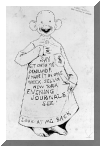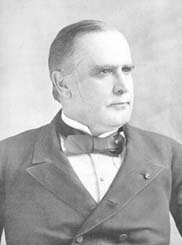USII.4a The Spanish American War
a) explaining the reasons for and results of the Spanish American War.
What were the reasons for the Spanish American War?
** Economic interests and public opinion often influence U.S. involvement in international affairs.
• Protection of American business interests in Cuba
• American support of Cuban rebels to gain independence from Spain
• Rising tensions as a result of the sinking of the U.S.S. Maine in Havana Harbor
• Exaggerated news reports of events (Yellow Journalism)
What were the results of the Spanish American War?
** The United States emerged as a world power as a result of victory over Spain in the Spanish American War.
• Cuba gained independence from Spain.
• The United States gained possession of the Philippines, Guam, and Puerto Rico.
Background and Detail
The content above is from the
curriculum resource guide. To put the facts above in context, I have added
the additional detail below.
The war between the U.S. and Spain, lasted only 4 months. Most of the fighting occurred on Cuba and the Philippines on opposite sides of the world.
In 1895 Cuban nationalists began a revolt against the Spanish government. The U.S. was concerned about protection of American business interests in Cuba. American business owned huge tracts of land in Cuba to grow sugar, and the sugar trade was very profitable for U.S. business.
Cubans had been unhappy with Spanish rule for some time, and Americans were sympathetic. Spain's harsh attempts to put down the Cuban revolt and cruel treatment of the Cubans increased support in the U.S. for Cuba's struggle for independence. President McKinley, however, had personally seen so much death and destruction during the Civil War that he was hesitant to get involved.
Yellow Journalism
Newspapers, competing for sales, exaggerated
stories of the horrors of Cuban life under oppressive Spanish rule.
The Spanish had confined many Cubans to concentration camps. The
press called them "death camps." and wrote headlines like
Spanish Cannibalism, Inhuman Torture, Amazon Warriors Fight For
Rebels. Newspapers sent hundreds of reporters, artists, and
photographers to Cuba to report Spanish atrocities.
One photographer sent to cover the Cuban revolt sent back the
message, "There
 is
no war. Request to be recalled." His boss sent back a cable,
"Please remain. You furnish the pictures, I'll furnish the
war." These newspaper stories of Spanish cruelty sold
newspapers and swayed public opinion in favor of intervention.
is
no war. Request to be recalled." His boss sent back a cable,
"Please remain. You furnish the pictures, I'll furnish the
war." These newspaper stories of Spanish cruelty sold
newspapers and swayed public opinion in favor of intervention.
The name Yellow Journalism came from this popular cartoon of the Yellow Kid, who wore a yellow gown gown while he mocked upper-class customs.
The Battleship Maine
The battleship
Maine was sent to Cuba to show
American concern over Spanish actions and support for the Cuban
rebels. The Maine had been in Havana Harbor three weeks when the
captain wrote the trouble in Cuba was almost over and the new
Spanish governor had the situation under control.
 Then
one night the battleship blew up and sank, killing 266 men. The
American press immediately blamed the Spanish, though there was no
evidence that the the Spanish were responsible. In order to attract
readers they even faked pictures showing Spanish soldiers planting mines
around the ship. Hundreds of editorials demanded revenge. Soon a rallying
cry could be heard everywhere -- in the papers, on the streets, and in the
halls of Congress: "Remember the Maine! To ** with Spain." President
William McKinley was pressured by Congress into asking for a declaration
of war.
Then
one night the battleship blew up and sank, killing 266 men. The
American press immediately blamed the Spanish, though there was no
evidence that the the Spanish were responsible. In order to attract
readers they even faked pictures showing Spanish soldiers planting mines
around the ship. Hundreds of editorials demanded revenge. Soon a rallying
cry could be heard everywhere -- in the papers, on the streets, and in the
halls of Congress: "Remember the Maine! To ** with Spain." President
William McKinley was pressured by Congress into asking for a declaration
of war.
The U.S. Becomes a World Power
The war itself lasted only four months, from mid-April to
 mid-August
1898. There were 379 American combat deaths, but more than 5,000
servicemen died of disease.
mid-August
1898. There were 379 American combat deaths, but more than 5,000
servicemen died of disease.
What of the war's consequences? Most immediately it produced the nation's
first overseas empire
Begun over the cause of Cuban independence, the war marked the emergence
of the United States as a world power and the beginning of American
overseas imperialism. Most of the fighting occurred in the Spanish
possessions of Cuba and the Philippines on opposite sides of the world.
Representatives of Spain and the United States signed a peace treaty in
Paris on December 10, 1898 established the independence of Cuba, ceded
Puerto Rico and Guam to the United States, and allowed the victorious
power to purchase the Philippines Islands from Spain for $20 million.
